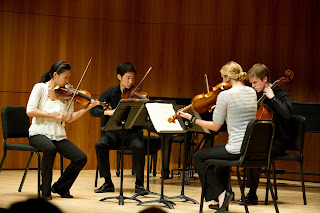Here is another fun music game to play with two or more preschoolers. I got this idea from the book:
Music Games and Activities For Early Childhood by Margaret Athey and Gwen Hotchkiss.

Have some music ready to play either on piano or a CD that is played on your CD player. Digital devices will work, too, if you have a speaker that will enhance/amplify the sound. Then, make up a scenario such as one child gets to be the mouse and the other child gets to be the cat. Next, if you are playing the piano, play some medium tempo music in the treble part of the piano and tell the child playing the part of the mouse that the music you are playing now is when they will act like a mouse.
You may be the one to decide just what that behavior will be! Maybe the mouse will scurry around looking for cheese or maybe they'll just be a dancing mouse staying in a small area of the room. When you change the music that you are playing on the piano to a slow song played in the bass part of the piano, that means the mouse has to suddenly go into a crouch position on the floor because the low music means the child playing the part of the cat is active now. The cat can only move slowly because the music is slow but the cat is allowed to come up to the mouse and look hungrily at the mouse, although no touching is allowed. You may want to have a boundary like a piece of tape on the floor or a piece of furniture in the way so the cat won't be tempted to touch the mouse. Then, you should change the music back to the more upbeat song in the treble part of the piano which is a cue for the cat to go back to the area they were originally in and the mouse can move again. Repeat as many times as you like and the children may switch roles, too.
If you are using a CD player or digital device, you'll need to have two contrasting songs ready to toggle back and forth so the mouse will know when to move and crouch and the cat will know when to wait and move.
Some suggestions of music to play when the mouse is moving might be: Golliwog's Cakewalk by Debussy; any upbeat movement of the Nutcracker Suite; any upbeat/up tempo piece by Mozart, Haydn, Bach, Beethoven, or Brahms.
Some suggestions of music to play when the cat is moving might be: Horn Concerto #2, Andante Movement, by Mozart; New World Symphony, Largo Movement, by Dvorak; any slower movement or piece by Mozart, Haydn, Bach, Beethoven, or Brahms.
Of course, it's perfectly fine to use pop or any ethnic music you like. Irish music works well for this activity and jazz works nicely, too.
The reason this activity for young children is musically helpful to the child is because it incorporates focus, listening, creativity, coordination, and cooperation. I guarantee that everyone will have fun in the process!













.jpg)
.jpg)





